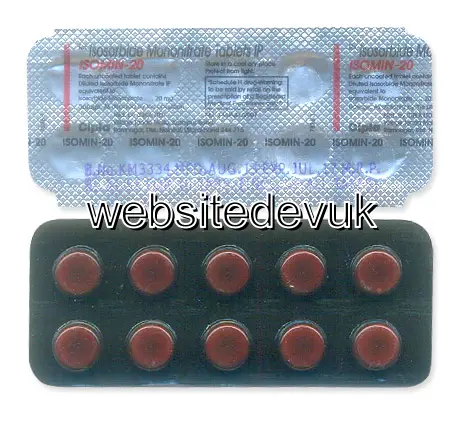| Package | Dosage | Price | Price per Dose | |
|---|---|---|---|---|
| Dosage: 20mg | ||||
| 360 pill | 20mg | £193.42 | £0.54 | |
| 180 pill | 20mg | £109.41 | £0.61 | |
| 120 pill | 20mg | £82.05 | £0.68 | |
| 90 pill | 20mg | £68.38 | £0.76 | |
| 60 pill | 20mg | £52.74 | £0.88 | |
| 30 pill | 20mg | £32.23 | £1.06 | |
| Dosage: 40mg | ||||
| 360 pill | 40mg | £253.02 | £0.70 | |
| 180 pill | 40mg | £131.88 | £0.73 | |
| 120 pill | 40mg | £88.89 | £0.74 | |
| 90 pill | 40mg | £70.33 | £0.78 | |
| 60 pill | 40mg | £51.77 | £0.87 | |
| 30 pill | 40mg | £28.32 | £0.96 | |

Isosorbide Mononitrate Description
Overview of Isosorbide Mononitrate
Isosorbide Mononitrate is a widely prescribed medication primarily used to prevent chest pain, also known as angina. It belongs to the class of drugs called nitrates, which work by dilating blood vessels. This action helps improve blood flow to the heart muscle, reducing the frequency and severity of anginal attacks. The medication is available in various formulations, including tablets with immediate or extended-release properties, providing flexibility based on patient needs.
How Does Isosorbide Mononitrate Work?
The main mechanism of Isosorbide Mononitrate involves relaxing the smooth muscles within blood vessel walls. By relaxing these muscles, the drug causes vasodilation, leading to decreased vascular resistance. This reduction in workload helps the heart pump more efficiently and lessens oxygen demand, which alleviates the symptoms of angina. Additionally, improved blood flow helps prevent the formation of blood clots, further lowering the risk of heart attacks in high-risk individuals. It's important to follow the prescribed dosage to maximize benefits and minimize side effects.
Benefits and Effectiveness
Many patients find Isosorbide Mononitrate highly effective in managing chronic angina symptoms. It provides long-lasting relief, especially when taken as extended-release tablets, which can be taken once daily. This convenience encourages regular adherence to treatment regimens. Some users report a noticeable reduction in the frequency and intensity of chest pain episodes. Moreover, the medication can improve quality of life by allowing individuals to participate more freely in daily activities without the constant fear of anginal attacks.
Possible Side Effects and Precautions
Like all medications, Isosorbide Mononitrate can cause side effects. Common adverse reactions include headache, dizziness, flushing, and low blood pressure. These effects are often temporary and tend to diminish as the body adjusts to the drug. However, some individuals may experience more severe reactions such as allergic responses or significant drops in blood pressure, requiring medical attention. Patients with existing conditions like anemia, severe low blood pressure, or recent head trauma should consult their healthcare provider before starting this medication. It is also crucial to avoid alcohol consumption while taking Isosorbide Mononitrate, as it can intensify side effects.
Usage and Dosage Guidelines
Isosorbide Mononitrate should be taken exactly as prescribed by a healthcare professional. Typically, the medication is taken once daily, with or without food. The extended-release formulations are designed for convenient, once-a-day dosing, ensuring steady blood levels. It’s essential not to crush or chew the tablets unless specified, as this can alter the drug's absorption and effectiveness. Patients should also be consistent in taking the medication at the same time each day to maintain optimal therapeutic levels. If a dose is missed, follow the instructions provided by your healthcare provider or pharmacist.
Conclusion
Overall, Isosorbide Mononitrate is a reliable and effective medication for managing angina symptoms. It offers prolonged relief and can help improve daily life for those living with chronic chest pain. While it has some potential side effects, most are manageable with proper medical guidance. As with any medication, adherence to prescribed instructions and regular consultations with a healthcare professional are key to achieving the best outcomes. Patients should discuss their complete medical history with their doctor before starting this treatment to ensure safety and effectiveness.